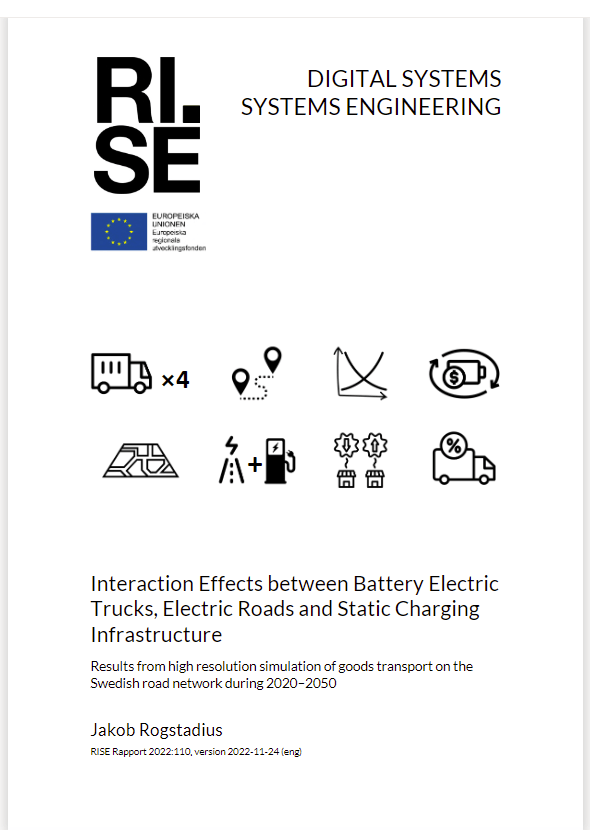RISE shares report on how innovation can support the uptake of electric trucks
Interaction Effects between Battery Electric Trucks, Electric Road Systems, and Static Charging Infrastructure gets analysed in a recent report by POLIS member RISE.
 In November 2022, POLIS member RISE (Research Institute of Sweden) published a report on the intricate interactions between heavy-duty trucks with diesel and battery power, dynamic vehicle charging via electric roads, and static charging via different types of charging infrastructure.
In November 2022, POLIS member RISE (Research Institute of Sweden) published a report on the intricate interactions between heavy-duty trucks with diesel and battery power, dynamic vehicle charging via electric roads, and static charging via different types of charging infrastructure.
The report, titled Interaktionseffekter mellan batterielektriska lastbilar, elvägar och statisk laddinfrastruktur: Resultat från högupplöst simulering av godstransporter på det svenska vägnätet under perioden 2020–2050 and available for download in Swedish or as a machine-translated English version, aims to determine how the above-mentioned components should be integrated together in an optimal way to reduce the cost to society while also achieving our demand for significantly lower greenhouse gas (GHG) emissions from heavy-duty road traffic.
Electrifying Sweden
RISE's report will assist Sweden's efforts to electrify heavy-duty truck traffic, which are now impeded by the lack of public charging infrastructure. Indeed, in order to meet Sweden's ambitious goals for GHG emission reductions for road traffic (70% reduction by 2030), battery-electric vehicles must be quickly adopted.
 RISE analysed hundreds of scenarios for the future expansion of charging infrastructure in Sweden with inputs such as individual route, vehicle class and year, battery capacity and charging locations. Results show that depot charging and charging via electric roads on up to approx. 6,000 km of the Swedish road network, show major competitive advantages versus fast charging stations located at rest stops and destinations.
RISE analysed hundreds of scenarios for the future expansion of charging infrastructure in Sweden with inputs such as individual route, vehicle class and year, battery capacity and charging locations. Results show that depot charging and charging via electric roads on up to approx. 6,000 km of the Swedish road network, show major competitive advantages versus fast charging stations located at rest stops and destinations.
To ensure an optimized and cost-effective process, major roads inside larger cities should be included as part of the electrified road network as early as possible, and the development and expansion of an electric road for heavy-duty trucks should be coordinated and connected with neighbouring countries, since a large proportion of the heavy traffic on the Swedish road network is international.
A long-term plan
The RISE report highlighted that, in order to lower the business-economic risk for private investors in other charging infrastructure as well as battery electric vehicles, a long-term reliable political decision should be made regarding whether electric roads will be established, and if so, when and along which routes.
Sweden is pioneering the development of electric roads. Recently, it has decided to install the country’s first vehicle-charging electric road in the county of Örebro, about 100 km west of Stockholm, in 2025. During the last POLIS Conference, a cost-benefit analysis of electric roads in the city of Lund was showcased during the Session 'Out of the box: Exploring new use cases for electromobility'.
Are you interested in reading more about RISE's report on Interaction Effects between Battery Electric Trucks, Electric Road Systems, and Static Charging Infrastructure?
A recorded presentation (Swedish) and presentation slides (English) are also available - moreover, you can read an article about it in English right on LinkedIn.
